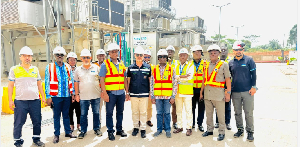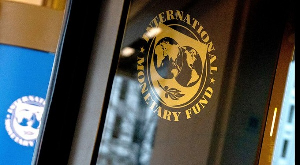First National Bank started operating in Ghana a little less than five years ago with one major unique selling proposition: innovation. The bank promised to introduce products and services never before seen in the Ghanaian banking sector and nearly 60 months after the opening of its first branch at the Junction Mall in the east end of Accra, it is fair to ask if the bank has fulfilled its promise.
The answer from almost every one of the bank’s clients would most assuredly be an emphatic ‘yes’. That sort of response should not come as a surprise to even the most casual observer of the Ghanaian banking scene.
First National Bank Ghana Limited, with South Africa’s FirstRand Group as its parent company, did not come to Ghana with the cacophonous bells and whistles which usually accompany many a new entrant. They started with just one small branch but a big vision to become one of the most preferred banking institutions in Ghana on the wings of a promise to become a leader in banking innovation.
That singular premier branch at the Junction Mall meant that the bank was effectively forcing itself to live up to its promise and thus one of the first signs that it was serious about innovation was the introduction of user-friendly, always-on digital platforms which made it possible for customers to engage in all sorts of banking transactions without having to step foot in a banking hall.
So long before the older banks in the country became obsessed with mobile apps and internet banking, First National Bank Ghana Limited had shown the way with technology, products and services that made it utterly unnecessary for customers to enter its single banking hall. For example, First National Bank introduced Geo Payment, the first on the market is an electronic payment system that enables its customers to send and receive money when in proximity with other customers of the bank. The service allows seamless transfer of money with a mobile phone without having to input the recipient’s bank details.
“We started off with a determination to drastically reduce and if possible, eliminate, the reasons why people are compelled to drive through bumper-to-bumper traffic at great cost to productivity and the environment just to transact business in a banking hall,” says Mr. Delali Dzidzienyo, head of marketing and corporate communications at First National Bank Ghana.
“I know of countless cases where serious business executives have been literally forced to drive long distances to the bank, just to sign a paper to either transfer money or receive it. Many people didn’t like that and we are glad that we’ve been able to change that mentality, that culture. Today, many are following our lead by introducing mobile apps and internet banking. In 2020, there are a lot of innovations in store for customers, which we hope will strengthen our position as the most innovative bank in Ghana today.”
One of these innovations is First National Bank’s quest to use its world-class, tried and tested agency banking model to support the Ghana government’s financial inclusion drive, bringing banking services to the doorsteps of as many Ghanaians as possible. The model is somehow an extension of the bank’s philosophy to operate and maintain as few brick and mortar facilities as possible by using digital technology and community banking agents to enable people who otherwise would be keeping cash under their beds to access affordable and helpful banking services.
Under the initiative, the bank will partner with existing businesses in various communities to set up agencies which will offer a range of banking services to customers. It is expected that the successful roll-out of the agency banking service will help increase the bank’s footprints across the country and provide convenient banking to existing and future customers. These agencies will provide almost all of the suite of services customers may want to access from any of the bank’s sevenbranches in the Accra-Tema metropolis – that is if they ever feel the need to go into a branch. The objective is to expand the bank’s reach in Ghana and bring it world-class services to the doorsteps of Ghanaians without having to open too many brick and mortar branches.
First National Bank Ghana Limited is also set to enable the contactless feature on its POS machines which are being used by retailers across the country. These machines use state of the art technology which make it unnecessary for customers to hand over their cards to a vendor before they enter their personal identification numbers (PINs) to conclude transactions.
To enable this feature the bank will in the next few weeks start issuing contactless banking cards, which make it possible for transactions to be concluded by simply tapping the card on a contactless-enabled machine and then proceeding to enter their PINs.
“Contactless payments offer substantial benefits in an era where consumers and retailers want to avoid long queues and the risk of fraud or card theft,” Hannah Annobil-Acquah, First National Bank’s Head of Retail Banking says.
“We are creating an enabling safe ecosystem for retailers to match consumer appetite by enabling and promoting the contactless acceptance footprint in the retail environment. And that’s a very useful and helpful ‘first’ from First National Bank.”
That’s not all, however.
Perhaps, First National Bank’s most important contribution to the Ghanaian banking and financial services sector in 2020 could be its reported moves to enter the mortgage market to help Ghanaians deal with one of the biggest life challenges in the country: providing a roof over one’s head.
The details of the bank’s proposals to enter the mortgage market are not entirely clear and the bank’s officials are often tight-lipped when the issue is raised, apparently because they need regulatory approval to tie the loose ends. It is only then that the full outlines of what the bank really has in store for Ghanaians will be made clear.
But even before that happens, few will disagree that it is a little more than ironic that a bank which is staking its future on reducing dependence on brick and mortar structures also sees potential in helping Ghanaians to invest in brick and mortar structures they can call home. It’s ironic. But it’s also innovative thinking. And that’s the First National Bank way, isn’t it?
General News of Thursday, 6 February 2020
Source: First National Bank Ghana













